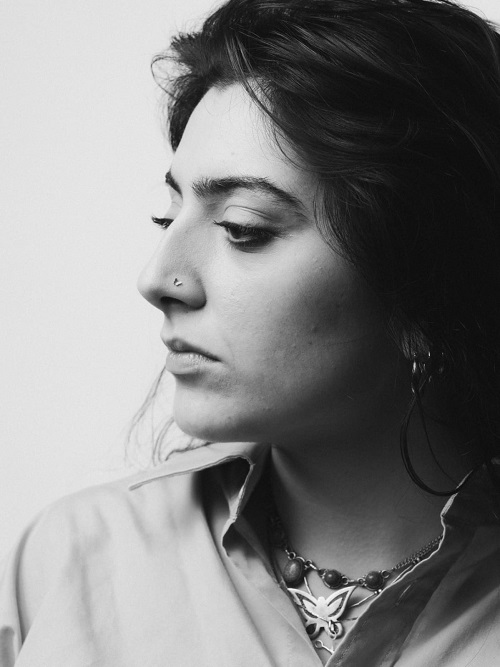On the occasion of the fifth edition of the “Between Land and Sea” Festival, by Studio Rizoma Fondation, Genny Petrotta presents a poetic ode to the lost play on the history of the Peasant People’s Republic of Piana degli Albanesi, from 26 May to 9 June 2024. Piana degli Albanesi is a town, near Palermo, founded more than five hundred years ago by an Italo-Albanian community, called the Arbëreshë, that still maintains its language and traditions. On 31 December 1944, a group of young revolutionaries, led by Giacomo Petrotta, proclaimed the Peasant People’s Republic of Piana degli Albanesi, the result of a rebellion against the mismanagement of the agricultural Harvest by an alliance of large landowners and political elites that left the population starving.

Genny Petrotta and Luna Brancaccio, “MAMMA PERDONAMI / MËMA MË FAL”, video still, 2024. Courtesy the artist and Fondazione Studio Rizoma
The artist Genny Petrotta (1990), great-granddaughter of the leader, was fascinated by this story as a teenager and, almost eighty years later, made the video Mamma Perdonami / Mëma më fal, based on a lost play narrating the story of the autonomous Republic, with a text in the Arbëreshë language. Genny Petrotta searches for traces of community rebellion and gathers evidence of a lost history. The seeds of her interest were planted by her grandmother, who told her about the torture her great-uncle suffered for being a socialist and a libertarian. For fifty days, six hundred young people from Piana degli Albanesi tried to change their country, in the name of unity and community they acted on power instead of suffering from it, but the collective removal created a layer of silence and fog. In the video they say: «We took the glass from the churches to put it in the schools. The saints could stay without glass, but the children could not», testifying to the state of fear and loss of trust in the authorities. The story begins and ends with a confrontation with the authority, in total darkness, hidden – according to one of the artist’s hypotheses – also by the shame of the torture suffered.

Genny Petrotta and Luna Brancaccio, “MAMMA PERDONAMI / MËMA MË FAL”, video still, 2024. Courtesy the artist and Fondazione Studio Rizoma
In order for the story to survive, Petrotta involves children and young people in her work, so that they can participate in the oral and written transmission. An important contribution was made by Angela Lanza, who, together with Giacomo Petrotta, published Testimonianze da una repubblica contadina. G. Petrotta e i giovani di Piana degli Albanesi (Edizioni Centofiori, 1978), a reading shared by the artist with young people in schools in the area, which gave rise to debates and reflections reflected in the contemporary. The students were also involved in a series of workshops for the creation of stage costumes, under the supervision of Gabriele Petta. Other collaborators included Angelo Sicurella for the vocal workshops, Giuseppe Borgia for the set design and Gloria Dorliguzzo for the choreography. According to Giacomo Petrotta, a play was performed at the time that told the story of the young autonomous republic, the text of which has been lost. For the performance of the play, the original text was reconstructed thanks to the contribution of Giuseppe Schirò from Modica, a friend of Giacomo Petrotta, from whom the artist takes lessons in ancient Albanian poetry. In the video, “Struggle is the most beautiful feeling” is recited, despite the tears of the mothers of the tortured youths. The core of the whole project are the children, the heirs of history, the children of the Piana degli Albanesi, those whom Giacomo Petrotta could not have because of torture and those who made a revolution.

Genny Petrotta and Luna Brancaccio, “MAMMA PERDONAMI / MËMA MË FAL”, video still, 2024. Courtesy the artist and Fondazione Studio Rizoma
Mamma Perdonami / Mëma më fal consists of a video installation and a book produced by Studio Rizoma Fondation in collaboration with Biennial Highway Prizren, with the support of several national and international cultural institutions, including Castelbuono Civic Museum, Genía Lab Art Palermo, Postane Istanbul, Inland Madrid, Museum of Civilisations Rome and European Alternatives Paris. The project is also supported by the General Directorate for Contemporary Creativity of the Ministry of Culture within the framework of the Italian Council 2023.
Angelica Lucia Raho
Info:
Genny Petrotta. Mamma Perdonami / Mëma më fal
26/05 – 9/06/024
Museo Civico Castelbuono
Piazza Castello, Castelbuono (PA)
www.museocivico.eu

Lecce, 1999. After a three-year degree in Communication and Art Teaching and a two-year specialist course in Visual Cultures and curatorial practices at the Brera Academy of Fine Arts, she collaborates with art magazines and with independent curatorial projects between Lecce and Milan.






NO COMMENT